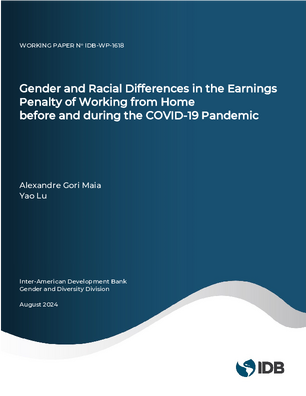Gender and Racial Differences in the Earnings Penalty of Working from Home before and during the COVID-19 Pandemic
Date issued
Aug 2024
Subject
Labor Force;
Telework;
Coronavirus;
Women;
Pandemic;
Diversity and Inclusion;
Diversity in the Workplace;
Gender;
Workforce and Employment;
Wage;
Race;
Gender Mainstreaming
JEL code
J16 - Economics of Gender • Non-labor Discrimination;
J21 - Labor Force and Employment, Size, and Structure;
J31 - Wage Level and Structure • Wage Differentials
Country
Brazil
Category
Working Papers
We investigate differences in earnings penalties associated with working from home (WFH) between groups of gender and race before and during the COVID-19 pandemic in Brazil. Using a large and nationally representative longitudinal dataset, we show that the earnings penalty associated with WFH diminished for White and Black men during the pandemic while remaining high for White and Black women. We further examine three mechanisms explaining these changes: i) the equilibrium between supply and demand, as more women than men transitioned to WFH during the pandemic; ii) labor productivity, as the effective working hours of Black women were more affected by WFH; and ii) visibility and promotion, as White women became less likely than White men to be promoted when WFH during the pandemic.
Generative AI enabled




